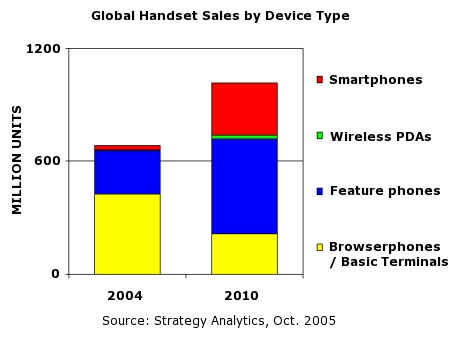Palm Linux mobile phones coming this year?
Oct 7, 2005 — by LinuxDevices Staff — from the LinuxDevices Archive — viewsPalm will ship Linux-powered mobile phones this year, say sources claiming to be close to the company. The devices will be powered by Wind River Linux, and pending carrier reaction, may well be the first Linux-powered handsets distributed widely within the US.
So far, Linux mobile phones have proliferated primarily in Asia, where mobile network build-outs have been larger and arguably more advanced than in the US, in part because some Asian countries lack significant last-mile copper infrastructure. Strong sales of Linux handsets in Japan helped Linux surpass Windows Mobile in handset OS shipments earlier this year, according to Gartner. Still, Symbian remains the leader among “complex” phone OSes, and is expected to gain marketshare over the next several years, while Linux and Windows Mobile will also grow, studies from both IDC and Gartner suggest.
 Palm (formerly PalmOne) last week introduced a version of its popular Treo smartphone powered by Windows Mobile (pictured at right), and during a press event with Bill Gates, Palm CEO Ed Colligan is reported to have said, “No, we don't need another operating system,” in response to questions about whether Palm would base a future version of the Treo on another OS, such as Linux. “Do not take developing a product on a whole new platform lightly,” Colligan added.
Palm (formerly PalmOne) last week introduced a version of its popular Treo smartphone powered by Windows Mobile (pictured at right), and during a press event with Bill Gates, Palm CEO Ed Colligan is reported to have said, “No, we don't need another operating system,” in response to questions about whether Palm would base a future version of the Treo on another OS, such as Linux. “Do not take developing a product on a whole new platform lightly,” Colligan added.
A Linux-based Treo may not be in the cards anytime soon, but Palm could certainly deliver a feature phone without “developing a product on a whole new platform,” as Colligan put it. Palm OS supplier PalmSource has been working with singular purpose for a year to turn the Palm OS into a middleware layer that runs on top of Linux.
Considering that Palm is PalmSource's only significant licensee for the Palm OS, it wouldn't really make sense for PalmSource to have decided to move to Linux without the approval of its best customer. Palm's endorsement of PalmSource's Linux move is also implicit in the fact that Palm recently tried to buy PalmSource back.
In other words, Palm may have gone to Windows for high-end smartphones such as the Treo, but Linux looks to be the company's longterm strategy for the feature phone market — a significantly higher volume market in the near term, according to research from Strategy Analytics (see chart below).

Mid-market “feature phones” represent the highest-volume nearterm opportunity in mobile phones, according to Strategy Analytics
Several Linux mobile phone software vendors, including Trolltech and MontaVista, have said that Linux will work better on feature phone-level hardware than either Symbian or Windows Mobile. Symbian has failed to interest customers in its feature phone-level OS products, while Microsoft has concentrated solely on high-end smartphones, leaving Windows CE licensee Intrynsic to pick through the tasty feature phone crumbs. Of note, Intrynsic last week announced it secured $8M in funding in support of its Windows CE feature phone stack.
As part of its transition to Linux, PalmSource acquired China MobileSoft in a deal consummated on Valentine's Day of this year. At the time of its acquisition by PalmSource, CMS already had about 70 customers using its mobile phone stacks on RTOSes in China, as well as an entire Linux phone OS in the works, according to PalmSource Engineering VP Michael Kelley. Our anonymous sources confirmed that Palm's first Linux-based handsets will use a version of Linux developed by Wind River.
Wind River's VP of Marketing, John Bruggeman, told LinuxDevices last week that at least one customer of Wind River Linux expects to ship a mobile handset in the US market “before Christmas.” Given that PalmSource has been focused on its Linux phone mission for about a year now, the timing seems about right for Palm's name to show up on one those Wind River Linux handsets.
On the other hand, Linux is a multi-vendor opportunity, and Palm has also joined MontaVista's mobile phone software ecosystem.
First US Linux phones will run Palm apps?
While the exploding Asian market has so far proved a more attractive target for Linux handset developers, no one has more incentive to bring Linux phones to the US than Palm. Two decades of Palm Pilot popularity in the US have propelled the pocketable PDA company into the midst of the world's largest mobile computing software ecosystem here. An ecosystem, by the way, with a long history of being starved of adequate hardware resources. Much current feature phone hardware offers adequate resources to run legacy Palm applications on top of Linux.
Apps drive handheld purchases, and as a result, Linux-powered Palm-compatible phones would likely ignite yet another wave of robust growth and development among the countless ISVs (independent software vendors), corporate developers, and just plain users of the Palm platform — perhaps even relegating the recently unveiled Windows Mobile Treo to the status of “footnote in history.”
This article was originally published on LinuxDevices.com and has been donated to the open source community by QuinStreet Inc. Please visit LinuxToday.com for up-to-date news and articles about Linux and open source.